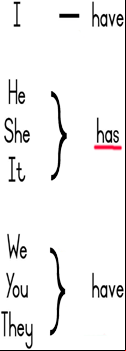| FORMA AFIRMATIVA |
FORMA NEGATIVA |
FORMA INTERROGATIVA |
 |
| I have (I've) |
I have not (I haven't) |
have I? |
| he, tengo |
no he, no tengo |
he?, tengo? |
| you have (you've) |
you have not (you haven't) |
have you? |
| has, tienes |
no has, no tienes |
has?, tienes? |
| he has (he's) |
he has not (he hasn't) |
has he? |
| ha, tiene |
no ha, no tiene |
ha?, tiene? |
| we have (we've) |
we have not (we haven't) |
have we? |
| hemos, tenemos |
no hemos, no tenemos |
hemos?, tenemos? |
| you have (you've) |
you have not (you haven't) |
have you? |
| habis, tenis |
no habis, no tenis |
habis?, tenis? |
| they have (they've) |
they have not (they haven't) |
have they? |
| han, tienen |
no han, no tienen |
han?, tienen? |
El verbo 'To have' puede tener el significado de "tener", "haber" u otros (como "tomar").
Dependiendo del sentido de la frase deduciremos de cual se trata.
 - I have a new book / Tengo un libro nuevo - I have a new book / Tengo un libro nuevo
- I have studied / He estudiado
- I have tea / Tomo t |
|






 - I have a new book / Tengo un libro nuevo
- I have a new book / Tengo un libro nuevo